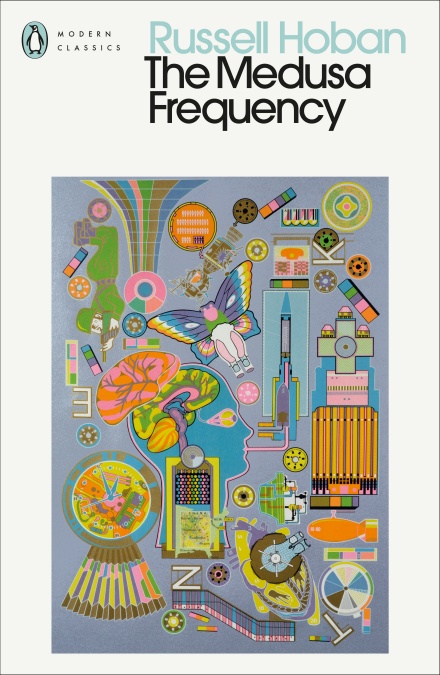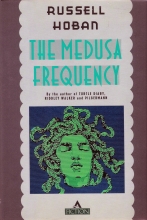The Medusa Frequency (Novel, 1987)

Summary:
A frustrated author hides away in his outpost in Fulham, working nights and trying to forget his lost love, looking for inspiration. Instead his computer puts him in touch with the Kraken, a fantastic squidlike mind in mid-existentialist crisis. A few wires-in-the-brain later, he becomes dogged by the severed head of Orpheus, which repeatedly insists on telling the story of Hermes and Calliope, and the invention of music and creativity.
From the jacket:
An inexplicable message flashed onto the screen of his Apple II computer at 3 a.m. heralds the beginning of a startling quest for frustrated author Herman Orff. Taking up the offer of a cure for writer's block leads him 'to those places in your head that you can't get to on your own' - and plunges him into a semi-dreamland inhabited by a bizarre combination of characters from myth and reality: the talking head of Orpheus; a lost love; the young girl of Vermeer's famous portrait - and a frequency of Medusas.
Full description:
Narrator Herman Orff is a London-based freelance writer of comics and an unsuccessful novelist. He is preoccupied by Vermeer's "Girl with a Pearl Earring", an ex-girlfriend called Luise von Himmelbett, and characters from mythology including The Kraken.
Lacking inspiration to write his third novel, he responds to a leaflet put through his letterbox advertising a treatment for blocked artists. The procedure turns out to be the invention of an old friend who was once also Luise's lover. Following the treatment, Orff periodically hallucinates, finding that spherical found objects (a stone on the banks of the River Thames, a football, a cabbage) appear to him as the dismembered head of Orpheus. Through a series of surreal scenes, the head tells Orff its "story", namely how he started playing the lyre, met Eurydice and lost her. In Hoban's retelling, Eurydice was not bitten by a snake and did not descend to the Underworld, but rather Orpheus was unfaithful to her and she left him for Aristaeus, reflecting a theme of fidelity and infidelity.
The scenes retelling the Orpheus myth are interspersed with Orff's daily life as he finds a new girlfriend, is hospitalised after suffering an attack of angina, bumps repeatedly into a character referred to as "Gom Yawncher" who turns up in various guises throughout London, and travels to The Hague to see the Vermeer painting in the Mauritshuis. Things get progressively worse for Orff as he makes key decisions about creativity, work and his past.
Review quotes:
"This book really isn't about plot, it's about ideas, comedy, poetry, the deep interplay of archetypal patterns, blighter's rock and the terror of being. It's about the writing, some of the very best Mr. Hoban has ever done. It's about Eurydice, old lovers and three a.m., inspiration and loss, and reading it is about the journey rather than the destination. This may explain why some fans of Mr. Hoban's more plot-driven books, like Riddley Walker, can sometimes be slower to warm up to The Medusa Frequency. But for those of us who read a book not to get to the end of it, but rather to savor its humor, wisdom, eloquence and insight, The Medusa Frequency is a priceless treasure. The sort of book that may take a little concentration to get through the first time, but after that never manages to sit on your bookshelf long enough to acquire a respectable film of dust before you pull it down to re-read passages at random, or look up a particular line or incident that's stuck in your mind."
--Dave Awl, The Head of Orpheus
"This slender book about love, art, loss and delusion, by the author of Riddley Walker and Turtle Diary (both also out of print), deftly combines a stubborn, self-deprecatingly British sense of humor with a mythic undertow of surreptitious power; the first time I read it, I wept through the conclusion without quite understanding why."
--Laura Miller, Salon
"Russell Hoban has proven himself a wordsmith and a punster on a par with Lewis Carroll and James Joyce...His restless, ranging imagination has succeeded in creating a mythic grandeur in the haunting head of Orpheus, and a lyric beauty in the fateful rendition of his tale."
--New York Newsday
"Ingenious...As reflective and paradoxical as a hall of mirrors, no doubt about it. And if you think novels should be about parents and kids and marriage and war and growing up, you'll probably hate it. Which is too bad, because Hoban's Medusa Frequency doesn't just blip for miserable scribblers. It blips for thee."
--The Village Voice Literary Supplement
"The always adventurous and unpredictable Russell Hoban--whose works range from the gentle Turtle Diary to the post-apocolyptic Riddley Walker now waxes mytho-comedic...The sublime and the ridiculous meet in a novel that is wise, funny and inspiring."
--The San Francisco Chronicle Book Review
"There's a sense of wonder in these passages...a love of fantasy and myth-making, an interest in language and puns, and a concern with philosophic speculation and the pyrotechnics of storytelling."
--The New York Times
"Russell Hoban's The Medusa Frequency is the sort of hyper-kinetic feat of the imagination that runs on high octane fuel and thunders across its surreal landscape at a dangerously high speed...in the course of this tour through the imaginative outback of Mr. Hoban's mind, we are treated to brilliant flashes of mordant humour, not to mention splendidly baroque evocations of present day London."
--The Listener
"The Medusa Frequency sparkles with classical allusions and a wisecracking American humour at times suggesting the Marx Brothers."
--The Daily Telegraph
"Short, smart and fizzy, the novel seeks out the roots of creativity with none of the solemnity that phrase implies."
--New Statesman
"Links to buy online" do not imply endorsement of the sellers. Users of this site are advised to compare prices before buying.


